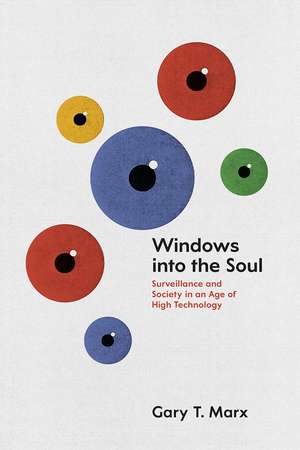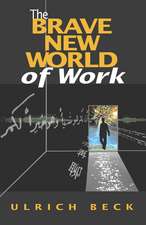Windows into the Soul: Surveillance and Society in an Age of High Technology
Autor Gary T. Marxen Limba Engleză Paperback – 31 mai 2016
We live in an age saturated with surveillance. Our personal and public lives are increasingly on display for governments, merchants, employers, hackers—and the merely curious—to see. In Windows into the Soul, Gary T. Marx, a central figure in the rapidly expanding field of surveillance studies, argues that surveillance itself is neither good nor bad, but that context and comportment make it so.
In this landmark book, Marx sums up a lifetime of work on issues of surveillance and social control by disentangling and parsing the empirical richness of watching and being watched. Using fictional narratives as well as the findings of social science, Marx draws on decades of studies of covert policing, computer profiling, location and work monitoring, drug testing, caller identification, and much more, Marx gives us a conceptual language to understand the new realities and his work clearly emphasizes the paradoxes, trade-offs, and confusion enveloping the field. Windows into the Soul shows how surveillance can penetrate our social and personal lives in profound, and sometimes harrowing, ways. Ultimately, Marx argues, recognizing complexity and asking the right questions is essential to bringing light and accountability to the darker, more iniquitous corners of our emerging surveillance society.
For more information, please see www.garymarx.net.
In this landmark book, Marx sums up a lifetime of work on issues of surveillance and social control by disentangling and parsing the empirical richness of watching and being watched. Using fictional narratives as well as the findings of social science, Marx draws on decades of studies of covert policing, computer profiling, location and work monitoring, drug testing, caller identification, and much more, Marx gives us a conceptual language to understand the new realities and his work clearly emphasizes the paradoxes, trade-offs, and confusion enveloping the field. Windows into the Soul shows how surveillance can penetrate our social and personal lives in profound, and sometimes harrowing, ways. Ultimately, Marx argues, recognizing complexity and asking the right questions is essential to bringing light and accountability to the darker, more iniquitous corners of our emerging surveillance society.
For more information, please see www.garymarx.net.
Preț: 304.45 lei
Nou
Puncte Express: 457
Preț estimativ în valută:
58.26€ • 60.48$ • 48.58£
58.26€ • 60.48$ • 48.58£
Carte tipărită la comandă
Livrare economică 22 martie-05 aprilie
Preluare comenzi: 021 569.72.76
Specificații
ISBN-13: 9780226285917
ISBN-10: 022628591X
Pagini: 400
Ilustrații: 15 halftones, 2 line drawings, 8 tables
Dimensiuni: 152 x 229 x 30 mm
Greutate: 0.57 kg
Ediția:1
Editura: University of Chicago Press
Colecția University of Chicago Press
ISBN-10: 022628591X
Pagini: 400
Ilustrații: 15 halftones, 2 line drawings, 8 tables
Dimensiuni: 152 x 229 x 30 mm
Greutate: 0.57 kg
Ediția:1
Editura: University of Chicago Press
Colecția University of Chicago Press
Notă biografică
Gary T. Marx is professor emeritus at the Massachusetts Institute of Technology and the author of Undercover: Police Surveillance in America. His writings have appeared in numerous publications, including the New York Times, Wall Street Journal, Washington Post, and New Republic.
Cuprins
Preface
Acknowledgments
Introduction
Part 1: Concepts: The Need for a Modest but Persistent Analyticity
1. Defining the Terms of Surveillance Studies
2. So What’s New? Classifying Means for Change and Continuity
3. So What’s Old? Classifying Goals for Continuity and Change
4. The Stuff of Surveillance: Varieties of Personal Information
Part 2: Social Processes
5. Social Processes in Surveillance
6. A Tack in the Shoe and Taking the Shoe Off: Resistance and Counters to Resistance
Part 3: Culture and Contexts
7. Work: The Omniscient Organization Measures Everything That Moves
8. Children: Slap That Baby’s Bottom, Embed That ID Chip, and Let It Begin
9. The Private within the Public: Psychological Report on Tom I. Voire
10. A Mood Apart: What’s Wrong with Tom?
11. Government and More: A Speech by Hon. Rocky Bottoms to the Society for the Advancement of Professional Surveillance
Part 4: Ethics and Policy
12. Techno-Fallacies of the Information Age
13. An Ethics for the New (and Old) Surveillance
14. Windows into Hearts and Souls: Clear, Tinted, or Opaque Today?
Appendix: A Note on Values: Neither Technophobe nor Technophile
Notes
References
Index
Acknowledgments
Introduction
Part 1: Concepts: The Need for a Modest but Persistent Analyticity
1. Defining the Terms of Surveillance Studies
2. So What’s New? Classifying Means for Change and Continuity
3. So What’s Old? Classifying Goals for Continuity and Change
4. The Stuff of Surveillance: Varieties of Personal Information
Part 2: Social Processes
5. Social Processes in Surveillance
6. A Tack in the Shoe and Taking the Shoe Off: Resistance and Counters to Resistance
Part 3: Culture and Contexts
7. Work: The Omniscient Organization Measures Everything That Moves
8. Children: Slap That Baby’s Bottom, Embed That ID Chip, and Let It Begin
9. The Private within the Public: Psychological Report on Tom I. Voire
10. A Mood Apart: What’s Wrong with Tom?
11. Government and More: A Speech by Hon. Rocky Bottoms to the Society for the Advancement of Professional Surveillance
Part 4: Ethics and Policy
12. Techno-Fallacies of the Information Age
13. An Ethics for the New (and Old) Surveillance
14. Windows into Hearts and Souls: Clear, Tinted, or Opaque Today?
Appendix: A Note on Values: Neither Technophobe nor Technophile
Notes
References
Index
Recenzii
“Nobody in field of surveillance studies has read, reflected on, or written about these trends with as much insight, wisdom, and humor as Marx. He has never been afraid to push the boundaries of social inquiry, not only by developing new theories, metaphors, or models, but by patiently amassing a rich variety of facts, stories, cases, incidents, and anecdotes and by trying to make some sense of the staggering and increasing propensity for surveillance. He relishes complexity and ambiguity and constantly tries to disaggregate and classify, not out of some infatuation with taxonomies for their own sake, but in a belief that we can only build generalizations about social trends if we are sensitive to context. Windows Into the Soul should be widely read for many years to come.”
“A challenging, thoughtful, erudite and at times very entertaining book. It is a work that draws on Marx’s long experience, detailed empirical research and intense scholarship, but weaves these things together without the loss of coherence of narrative that so often dogs academic work. . . . The coverage is breathtakingly broad and the book is a long one, supplemented by additional material on Marx’s website. . . . Not only an important book but a necessary one.”
“Marx’s latest book Windows into the Soul is a treasure—a joyful, entertaining sociological work reflecting a lifetime of study. It brings wisdom, experience, enthusiasm, and humor to complex issues affecting everyone. The book is useful and fun to read, containing provocative chapters such as those on work monitoring (‘The Omniscient Organization’) and national security/law enforcement (‘Rocky Bottoms’). Furthermore, it makes great use of images and music to illustrate how we experience surveillance through popular culture. This is a book for the general reader as well as the specialist.”
“Marx walks readers through how to evaluate all the new data that today’s surveillance technologies can collect, and he examines the issues that data can raise. He uses social-science research and his own interviews and observations to explore and explain the ethical, political, and cultural arguments that are used to justify and oppose surveillance efforts—and to look at their effects on people’s social, personal, and professional lives.”
“Few scholars have done more to shape the public understanding of the surveillance society than Marx. Drawing on theory and interviews, law and culture, Greek philosophers and rock and roll lyrics, Marx has made interesting and accessible the world of the watcher and the watched. Windows into the Soul carries forward a lifetime of inquiry and exploration. More than any other scholar, Marx has placed the study of surveillance before the public in a way that is rich in insight and filled with light touches.”
“Just when you think that you have read everything necessary about the surveillance state, comes this exceptional volume by a leading scholar that provides a whole book full of new insights and observations into an age old subject. Drawing on psychology, sociology, and keen observations, this is a text you will not want to miss.”
“Marx, a retired MIT scholar of the scrutiny of individuals through new and sophisticated technology, has written a book revisiting his conclusions after a long career as a sort of Sixties-oriented sociology expert on surveillance and its impact on individuals’ autonomy and privacy. . . . Marx has always peppered his scholarship with whimsy and wit, and his latest work is no exception.”
“Marx has played a vital role in anchoring surveillance studies as a distinct and important area of research. . . . Marx’s playful writing and crisp articulation make surveillance and social control approachable and coherent for inquiring minds and researchers old and new. . . . Marx has a presence in Windows that awards the book personality and wit, as pages are brought to life with humor, pop culture references, cartoons, and stories (both fictional and real). . . . The text is a must-read for anyone entering the field.”
“Sociologist Marx is one of the pioneers in surveillance studies. . . . Thirty years after his famous publication on undercover police he has now published a second, far reaching monograph. . . . Windows into the Soul impresses the reader through its content, as well as through its analytic stringency and the density of the material offered. . . . With ease, Marx approaches the complex and difficult questions of contemporary surveillance culture. Without any doubt, this must be defined as his ‘Opus magnum’ and rightfully so. However, in the reading it is much lighter and more entertaining than such a heavy title would make the reader believe.”
“In Windows into the Soul, Marx takes a critical social science approach to the study of surveillance and social control. Marx’s exploration of the field of surveillance studies is cumulative and inclusive, involving empirical, theoretical, ethical, and practical questions. References to literature, cinema, and pop culture are woven throughout the book, adding humor and illustration to Marx’s close study of a fascinating topic. . . . Marx concludes that the ideal is ‘a positive information society based on fairness, dignity, care, openness, trust, security, autonomy/participation, and communality, rather than a negative surveillance society based on unfairness, commodification, coercion, secrecy, suspicion, insecurity, domination/repression, and atomization.’”
“Marx, a leading figure in surveillance studies for more than twenty-five years, has at last published his maxime magnum opus, Windows into the Soul. The book breaks new ground and establishes some of the parameters of this expanding disciplinary area. It reflects his broad vision, expansive imagination, infectious curiosity, commitment to sensitive scholarship and to social justice, grasp of several cognate disciplines, awareness of the significance of popular culture, and an irrepressible sense of humor and grace. Marx’s perceptions are uncompromising and he engages, rather than shying away from, difficult issues. This work will continue to inspire new generations of surveillance scholars—whatever their disciplinary backgrounds or theoretical perspectives.”
“In a world punch-drunk on data, with both governments and corporations—not to mention private persons—increasingly recording and correlating our every move, Windows into the Soul is an important and timely book. With his decades of academic and policy experience, there's no one better than Marx to examine and explain surveillance in all its facets and complexities.”
“Marx’s Windows into the Soul addresses the one-way mirror stacked up to provide law enforcement and business enterprise with penetrating knowledge of anyone anywhere. In his magnificent style of inquiry Marx zooms in on the myriad ways by which this multi-focal mirror is engineered, instituted, and maintained. Expanding on his broad and deep knowledge of the capillaries of emerging surveillance engines, taking an analytical approach in the tradition of Goffman, Marx incorporates a pertinent acuity in relation to both technical and cultural aspects. He takes empirical research to another level. Ushering the reader beyond the current fascination for solutionism and Big Data fetishism, this book raises rigorous empirical questions, while testing the hidden assumptions of supposedly neutral solutions. A great read for all who need to know how back-stage operations inform front-stage presentations in the wondrous world of private and public surveillance.”
“For better and for worse, surveillance is now central to politics and our lives, and Marx’s magisterial survey is essential to understanding its multiple forms and facets. Simultaneously personal and learned, it is full of ideas and connections. To call it eye-opening would not only be too much of a pun but would be an understatement—it is mind-opening. Marx gives us no easy answers, but ensures that we will ask better questions.”
“Windowsinto the Soul offers a framework for surveillance structure, organization, practice, function, process, culture (including lengthy fictional scenarios), and ethical considerations. . . . A ‘magisterial’ study. . . . This is Marx’s strongpoint: a taxonomic completeness in many categories couched in a precise and expansive terminology, presented in many detailed charts and tables. . . . There is so much diverse material in this encyclopedic overview that the publisher expunged chapters on art, music, advertisements, policy, and other topics, some of which are available on the University of Chicago Press’s website. Here one will discover a total of 156 additional pages, often beautifully illustrated.”
“The first word that came to mind while reading this book was cornucopia. After decades of research on surveillance, Gary Marx has delivered an abundant harvest indeed. The book is much more than a straightforward treatise. It borders on the encyclopedic, and is literally overflowing with ideas, observations, and analyses. Windows into the Soul commands the attention of anyone interested in surveillance, past, present, and future. The book’s website contains a rich abundance of complementary material. An additional chapter consists of an intellectual autobiography discussing the author’s interest in, and personal experience with, surveillance over the course of his career. Because of its extraordinary breadth, the book should appeal to a wide readership…. it will be of interest to scholars of deviance and social control, cultural studies, criminal justice and criminology. But the book should be read well beyond the towers of academe. The security industry, broadly defined to include private security and intelligence companies as well as state law enforcement and intelligence agencies, would benefit from the book’s insights. So too should it be read by those in the information technology industries, including the manufacturers of the devices and applications which are central to contemporary surveillance, and which are shaping our future.”
“Marx's book is a brilliant summary of a vast literature and a clear and much needed conceptual clarification in the still emerging field of surveillance studies. His sage writing is very lucid, entertaining and informative. It’s a great singular read or an excellent companion to other well received and relevant surveillance studies including Joseph Turow’s The Aisles Have Eyes.”
“Marx’s magnum opus, Windows into the Soul, comes at an opportune time.... Marx’s capstone on his decades-long engagement with the topic helps identify points of obstruction in the field…. In breaking surveillance down into its constituent elements and detailing their composition, Marx’s work is simply without peer. Each chapter of the book is dedicated to a different broad dimension of surveillance.”
“The book provides a thoughtful discussion about the ethics of surveillance, as well as the balancing act governments and corporations maintain. . . . This book meets a very pressing need: it provides a thorough and fair examination of different theories about surveillance, and allows the reader to benefit from exposure to multiple perspectives. Marx knows he is dealing with a complex and constantly changing subject, and he does not try to offer simplistic solutions. Rather, his approach in writing Windows into the Soul is to encourage further conversation and further research.”
“Marx’s book, Windows into the Soul, provides a telling look into the underlying normative principles of a free society faced with incredible advances in technology coupled with a new and extremely worrying global terrorism threat. . . . Marx is a notable scholar with an impressive body of work in this area. His expertise shows throughout, as does his encyclopedic knowledge of the classic works and principles of social science. . . . The quality of the ideas and the questions posed are very enlightening and well worth the effort to read. . . . The best part of the book comes in the final chapter. It is here that the moral, ethical, and normative theoretical issues are laid out in a well-organized fashion.”
“In his most recent and grandest work on the subject, Marx wrestles with the behemoth that is surveillance. . . . He offers a conceptual map for scholars to tackle the murky moments of the new surveillance, from Snowden to polygraphs. Employing unorthodox methods for sociology, including fictional chapters, the work is an important contribution to surveillance studies and to the field of sociology as a whole. Highly recommended.”
“Windows into the Soul offers comprehensive and critical reflections on the shapes and trends of human surveillance. . . . Marx outlines his analytical uncertainties to the reader, [which] makes Windows refreshing and even more insightful because it leaves the discussion unfinished, enticing the reader to pose new questions and alternative ways of organizing the phenomenon and the field. . . . Marx might have intended for Windows to be an encyclopedic-conceptual handbook of surveillance for researchers of the field, but it also turned out to be a rigorous and inspiring exemplar of Weber’s methodological strategies.”
“Anyone who has listened to Marx talk, or spent any time on his website, will know what a truly prodigious knowledge and understanding he has of surveillance in contemporary society. This book … is demonstrative of this impressive grasp on the subject. Marx’s framework is both practical and approachable. . . . Windows into the Soul is of tremendous value. In addition, the work is entertaining throughout with a number of cartoons, references to popular culture, and a rich sense of irony. This is a valuable work that provides an analytic framework for approaching surveillance studies while avoiding the temptation to find simple solutions or offer easy judgments. It should find its way onto the shelves of every serious scholar and student of surveillance.”
“What Marx does in Windows into the Soul is create parameters for the social scientific study of surveillance in the twenty-first century. . . . Windows into the Soul is a snapshot of the work of an original, wide-ranging scholar who has done much to develop the study of surveillance.”
“Marx’s research and writing are very much in the tradition of Lewis Mumford, an historian and philosopher, Erving Goffman, a sociologist, and Seymour Martin Lipset, a political scientist and sociologist—all intellectual giants of the twentieth century whose scholarship revealed and explained much about post World War II society and whose insights continue to inform how we view the world today. Marx’s concern that social scientists have been overly concerned with narrow methodologies and speaking to the informed audience sharing their perspective derives from his respect for the earlier social scientists who asked large research questions and systematically evaluated the evidence. It is this type of scholarship that makes a long-lasting intellectual contribution. I suspect Windows into the Soul will as well.”
“From the beginning, Gary T. Marx played a critical role in shaping these deep shifts in the tectonic plates underlying our theoretical [surveillance] landscape....In Undercover (Marx, 1988), perhaps his most celebrated work, he developed a searching analysis of situations where police investigators assumed the identities of participants ....That work is properly hailed as a masterpiece for its sensitive accounts of the effects of these activities. . . . All these analytical and moral virtues are on display in Windows into the Soul. In many ways, this is a still more ambitious work than its predecessors. Here, he aims to present nothing less than a conspectus of lessons learned about surveillance over a long and distinguished career, a career devoted not only to empirical studies but also to deep reflection on the changing roles of surveillance and their significance for key values.”
“The book is an important and timely statement on the subject; but more, it is a tour de force of Marx’s trademark witty intelligence, engaging writing, and insightful social commentary….It is a provocative and bold summation of a life’s work that challenges us to eschew inflated pronouncements and focus our attention on understanding the context and consequences of the new technologies and surveillance mechanisms that permeate our lives.”
“This is a very important book.”
“Windows into the Soul is a distillation of the best of sociology and surveillance studies, it probes, it provokes, and it presents an account of the many tensions at the heart of surveillance. . .Windows is the product of a career’s worth of knowledge, experience, and research that enables Marx to move seamlessly between empirical work, satirical accounts, and theoretically grounded discussion. . .Marx has crafted an exceptionally crafted piece of sociological writing which constantly reminds us of the demands and questions we must ask of ourselves, of technology and of society.”
“This is a remarkable book. . .The detailed stories make his analysis vivid, while serving to clearly develop his own reasoning. . .Gary T Marx develops and clearly writes these sociological fictions with a great sense of irony and accuracy.”
“Gary T. Marx, emeritus professor at MIT, has spent a lifetime devoted to sociology in capital letters. . .Windows into the Soul is a compendium and deep reflection drawing on the laboriously elaborated fruit of a life time of work. . .As Marx points out at the beginning of the book: "the artist knows that something worthwhile lies within, but only immersion in the work can reveal it" (Marx, 2017: IX). The book is therefore a humble, but necessary, demolition of the epistemological barriers that inhibit understanding surveillance --whether these involve prejudice or annoying inaccuracies.”
“Marx achieves his goal of providing the reader both a conceptual map and an encyclopedic reference source of surveillance in modern Western society. . . .Researchers seeking to experiment with a sociological toolkit designed to scrutinize behaviors and motives in search of meaningful similarities will certainly benefit from this book.”
“No review can begin to do justice to this grand synthesis of a lifetime of critical social science research on surveillance. . . .Marx dresses his encyclopedic quest in sharply crafted prose that has a strong but “humbly skeptical” voice full of wit and wisdom, which informs, surprises and intrigues as he culls examples and insights
from sources ranging from Shakespeare to Superman. . . .Marx has proposed a laudable normative standard for democratic surveillance, much as Jurgen Habermas has developed one for democratic communication. They provide platforms for critics and activists to call out violations of democratic ideals.”
from sources ranging from Shakespeare to Superman. . . .Marx has proposed a laudable normative standard for democratic surveillance, much as Jurgen Habermas has developed one for democratic communication. They provide platforms for critics and activists to call out violations of democratic ideals.”
“The book is detailed, well-written, and smartly organized. Academic readers will appreciate the conceptual categories and taxonomies Marx uses to assemble the chapters and themes within the chapters. Academic readers also will appreciate the detailed footnotes and citations to studies as a way to organize many of the broader libertarian and justice-related issues the book identifies.”
"Marx's approach to his subject is exhaustive and can feel exhausting. However, one use for these materials is immediately apparent: as aids to teaching. For a class on surveillance studies, it is hard to imagine any more generously gathered—and easily excerpted—précis of the kinds of questions that can, do, or might arise about surveillance."
"There are two phrases which I think well represent both the book and the field of surveillance itself. The first is that ‘surveillance is neither good nor bad, but context and comportment make it so’. The second is that ‘modern democratic society is a farrago in a cauldron of conundrums accompanied by myths shielding harsher realities’. I most definitely recommend this book to academics, security practitioners and those interested in surveillance and security."
“The book is an invaluable resource for much needed surveillance courses in the social sciences and humanities alike….While it unfortunately runs short on discussing important research on how surveillance practices transpire at the level of the global, the book is nevertheless sure to stimulate serious theoretical engagement with this topic and encourage detailed, systematic, and focused empirical case studies and cross-cultural comparisons of how surveillance shapes sociality.”
“Marx who presents multiple aspects for his readers makes huge contribution to surveillance studies oeuvre thanks to this book…..Windows Into the Soul is an indispensable reference guide for academicians studying surveillance.”
“The book focuses on a crucial topic for democratic ideals --the dignity of the person and the type of society we are becoming or can become…. In focusing on the discovery, disclosure, concealment, access and protection of personal data the book contributes to the sociology of information.”
“Windows into the Soul: Surveillance and Society in an Age of High Technology by Gary T. Marx is the culmination of the author’s fifty-plus-year career as a sociologist studying surveillance and privacy….The most useful and accessible parts of the book are the fictional case studies peppered throughout.”














